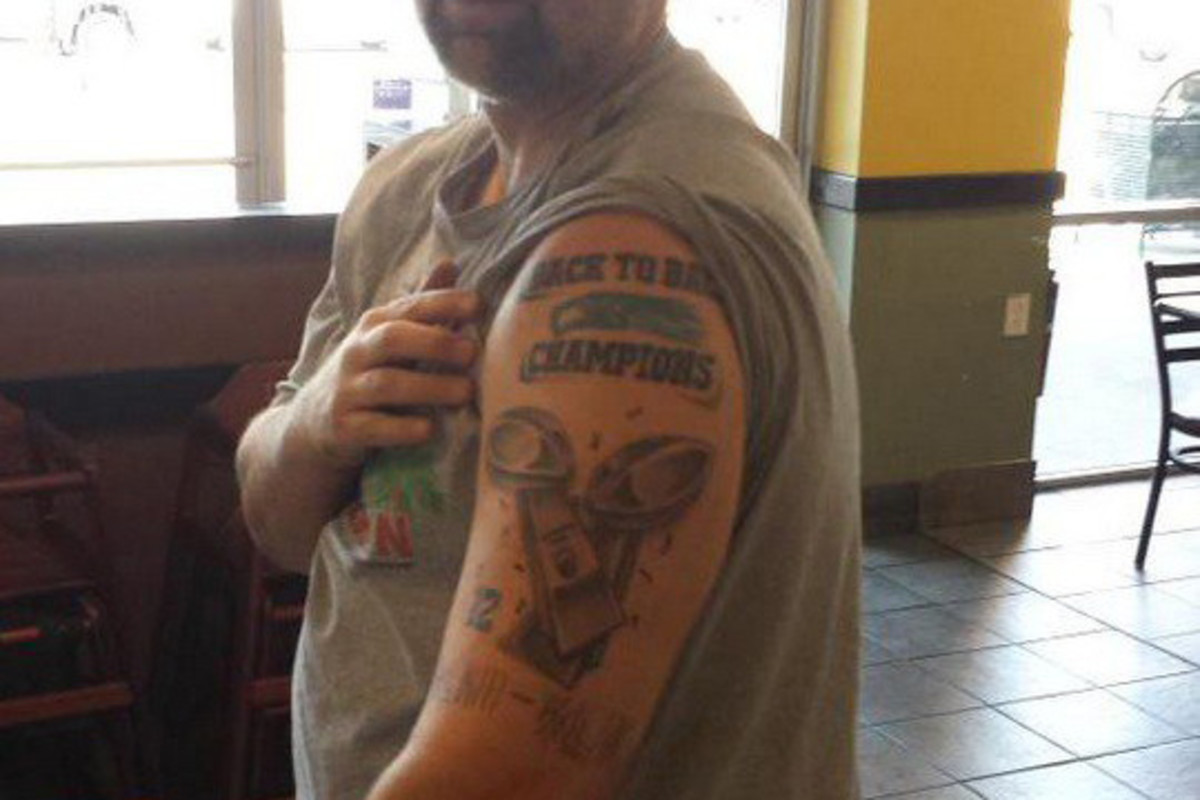How (and why) the premature championship tattoo became the ultimate badge of fan loyalty

A few days before last year’s NFC Championship Game, Jose Soberanes was at Royalty Tattoos in Phoenix. Soberanes, 28, who works at the shop as a tattoo artist, has lived in Arizona his entire life, and he had just watched the Cardinals beat the Packers in a thrilling playoff game the previous Saturday. He thought about the team’s looming showdown with the Carolina Panthers. Soberanes was proud of Arizona, and he wanted to do something to show it.
He decided to get an Arizona Cardinals logo next to a Super Bowl 50 emblem tattooed on his leg.
“I was super confident they were going to make it. I had a lot of faith in them,” Soberanes says. “Why wouldn’t I? I’m from here. I had faith in them that they were going to do it.”
That Sunday, the Panthers beat the Cardinals 49–15 in the NFC Championship.
If you’ve read about sports on the internet over the last few years, you’ve probably encountered stories of fans getting premature championship tattoos. There was the Kentucky fan who tattooed “40–0” next to the school’s logo, with an adorning “National Champs 2015” caption. (Three weeks later, Wisconsin beat Kentucky in the Final Four.) One Seahawks fan pre-emptively commemorated Seattle’s back-to-back Super Bowl titles with a tattoo in December 2014. (The Patriots beat the Seahawks in Super Bowl XLIX a few weeks later.) An Indians fan’s “2016 champs” tattoo went viral before Game 7 of the World Series. (The Indians were indeed 2016 American League champions, but that’s not the title he was foretelling.)
Not every predictive tattoo gets it wrong. Another Seahawks fan tattooed the team’s logo and “XLVIII Champs” on his arm in August 2013, and a few months later Seattle won the Super Bowl. A Cubs fan tattooed “Curse Broken,” complete with the Cubs logo as the “C,” above a “World Series Champions” banner before the 2016 postseason began, and roughly a month later he was rewarded.
Hey @Cubs & @IowaCubs, did you see one of our listeners got a #ChicagoCubs #WorldSeries tattoo? https://t.co/qciInyVFfn pic.twitter.com/njRTGGynRh
— 106.3 KXnO on the Iowa Sports Radio Network (@KXnO1063) September 29, 2016
Humans began tattooing their bodies thousands of years ago. The prevalence and use of tattoos has evolved with civilization, but the broader purpose behind these permanent emblems has remained relatively consistent: They evoke love, religion, punishment, status, superstition and other aspects of the human experience. Tattoos are identity claims, allowing us to declare who we are in permanent ink.
The rise of modern sports culture gave humans more reason to mark up their bodies. Through the development of teams and leagues, athletics became institutionalized, and the attachment of clubs to local communities allowed sports to take on a church–like role. Loyalty became the most valued quality in a fan, and tattoos became one way to show that loyalty.
The premature championship tattoo takes that desire to the extreme.
“They’re interested in showing their loyalty and they’re interested in displaying their fandom,” says Murray State professor Daniel Wann, who studies the psychology of sports fandom. “What better way to do that than to get a tattoo of a championship that hasn’t happened yet?”
For the fan, a tattoo of a team’s logo serves as a permanent public declaration of devotion. But using the body as a canvas for predicting a championship is a more recent phenomenon.
There’s no single justification for premature championship tattoos, but social media has undoubtedly been a major driver of their proliferation. Andrew Broadwater, who got a Pittsburgh Pirates champions tattoo before the 2015 postseason, saw other fans getting similar tattoos online. After contemplating it for a couple weeks, he woke up one morning and emblazoned his prediction in permanent ink on his left calf.
“It wasn’t for publicity or anything,” Broadwater, a Maryland correctional dietary officer, says. “I just thought the Pirates were going to win the World Series and I’d look like a genius.”
Pittsburgh ended up losing the Wild Card Game to the Cubs. (A few months later, Broadwater altered his tattoo to commemorate the Penguins winning the Stanley Cup.)
If there’s one thing that unifies the prematurely tattooed, it’s unconditional loyalty to the team. Derek Allgood, a diehard Cowboys fan, got a “World Champs” tattoo before the 2014 season. It was a last-second decision: His tattoo artist had joked with him that he didn’t want to give him the Cowboys logo, but that he’d do it if he made it a world champions tattoo. Allgood liked the idea and decided to go ahead with it, despite the artist repeatedly asking him if he was sure.
“I thought we were going to win the Super Bowl, like I do every year,” Allgood says.
Dallas lost in the NFC Divisional Round against the Packers. But Allgood has no regrets: The San Antonio radio host proudly wears his Cowboys champions tattoo, not that he has much of a choice.
In this way, fandom mirrors religion. A religious person doesn’t lose faith just because of a setback in life, just like a committed sports fan wouldn’t disown a team even after the most devastating loss.
“In some ways, it’s almost a win-win for them, because if they get the tattoo early and the team actually does come out on top, they’re going to look like the most loyal, positive, expect-the-best fan ever,” Wann says. “But if the team loses, they can still say, ‘Hey I got it wrong, but at least I’m loyal and die hard enough to have expected this.’ So it’s almost like they can wear it as a badge of their undying loyalty and undying optimism, win or lose.”
Blues fan Mike Kientzy, who works in construction, got a Blues Stanley Cup champions tattoo before the 2015 postseason after he won a radio contest. The station awarded the prize to the listener who gave the best reason why 105.7 The Point should pay for the tattoo. Kientzy’s winning answer: “I would let all the [players] bang my wife.” He says his wife didn’t mind the joke. (“She gets the humor of the radio station—that’s why I love her.”)
Despite the Blues failing to win the Stanley Cup, Kientzy doesn’t regret about the tattoo. In fact, it earns him respect from other fans: He says at last year’s Pointfest, a music festival in St. Louis, around 15 people approached him about the tattoo. Some of them wanted their picture taken.
Not everyone gets treated as a hero. Some Cardinals fans blamed Soberanes for jinxing the team. After the NFC Championship, Soberanes says, he received hundreds of messages, including some death threats.
The type of person who gets a premature championship tattoo, of course, is a very particular kind of sports fan. They’re highly identified, meaning that they have a deep connection with the team—so deep that the team becomes an extension of the fan’s own identity, research has shown. Highly identified fans experience the team’s successes and failures as their own.
Eric Simons, author of the book The Secret Lives of Sports Fans, notes that this level of fandom isn’t enough on its own to explain premature championship tattoos, even for the fans who subconsciously see the team as a projection of themselves. Going so far as to get a premature tattoo also requires the fan to have a certain type of personality independent of sports.
“There’s something in their psychology and outlook for the entire world that this is probably how they also are as professionals, in relationships, and that this is some sort of statement of personality independent of sports,” Simons says. “But because sports for them has become infused with their identity, they are expressing their individual personality in this way about sports because that’s how they are as people, as individuals.”
Shawn O’Connor, the Seahawks fan who got the back-to-back champions tattoo, describes himself as an “all-in type of guy.” O’Connor, a truck driver who goes by O.C., is a big gambler—he even has a gambling-themed tattoo on his arm, featuring a slot machine and dice—so betting on the Seahawks to win another championship in permanent ink wasn’t a big surprise. Getting a premature champions tattoo fit his broader personality independent of sports.

The prematurely tattooed haven’t been formally studied by psychologists or social scientists. But Penn State psychology professor Kevin Bennett, who studies personality, believes these individuals likely share a number of personality traits.
Psychologists often use the Big Five model to assess dimensions of personality. The Big Five consists of five broad personality factors: extraversion, agreeableness, openness, conscientiousness and neuroticism.
Bennett predicts these fans would likely score low on conscientiousness, a trait distinguished by self–discipline, organization and dependability. A low score on conscientiousness might reflect impulsiveness. He also believes they would score highly on extraversion, as there’s obviously some risk in getting this type of tattoo. Extraversion is partially defined by thrill-seeking, and an introvert would be far less likely to take such a leap of faith.
Bennett believes this type of person would likewise score low on neuroticism, meaning they experience little anxiety. They wouldn’t feel anxious if they’re late for work or miss an appointment, for example.
This combination of traits might translate to a job that requires success in high–pressure situations, like a relief pitcher in baseball.
“You actually find a lot of politicians, lawyers and CEOs that seem to have those personality traits, where they’re quite extroverted, because you have to be to be a public presence, and they’re very low in anxiety,” Bennett says. “Not to psychopathic levels, but to the point where they just don’t get nervous all that much.”
He also says the tattoos are less about prediction and more about conviction.
“These people are not in the business of predicting accurately,” Bennett says. “If they were, they would get tattoos that would say ‘Detroit Lions 2018 fourth place in the division.’ That might be an accurate prediction, but that’s not what they want to put on their arm. We only want to identify with championship teams.”
The internet is merciless when a tattoo prediction goes awry. But ironically, the tattoo actually gains value when the team falls short of a championship.
“They almost look better if the team loses in some ways,” Wann says. “Because they can say, ‘Hey, I was so loyal, I’m so optimistic, I got this tattoo. You wanna make fun of me for having a tattoo when they lost? Show me what you did that was so, so bold.’ It’s almost win-win.”
Adds Bennett: “In the rare case where somebody does get it correct, as soon as the team wins, the value of that tattoo must go down, because anyone can have a tattoo that says your team won.”
Nowadays, it’s rare for a major sporting event to occur without some fan posting a premature tattoo on Twitter or Instagram. Whether it’s about social media fame, loyalty or magical thinking—the idea that a given action can influence an unrelated event—these tattoos have become a staple of fan culture.
In some ways, the growing popularity of premature championship tattoos is a fitting metaphor for this age of alternative facts, where conviction has become more important than truth. Like fandom in general, these tattoos are a badge of loyalty—and removing them, a painful and potentially expensive process, would constitute betrayal.
“Whenever I see it, I just kind of smile,” Soberanes says. “It’s not going anywhere.”
